#dialect map
Explore tagged Tumblr posts
Text

Map of the different forms of the negator ('not') in Norwegian.
From: Mæhlum & Røyneland 2012. Det norske dialektlandskapet. Cappelen Damm Akademisk.
Map 22, by John Arne Eidsmo.
42 notes
·
View notes
Text
i have never been to any of these places

#my mom is from indiana but went to school in connecticut. her parents are from kentucky and louisiana (parish avoyelles babey)#i grew up in nw fl and in southeast ga#then rural indiana#i did most of highschool in wisconsin tho#how on gods green earth does the New Yorker think i am from Jackson MS#dialect map
0 notes
Photo
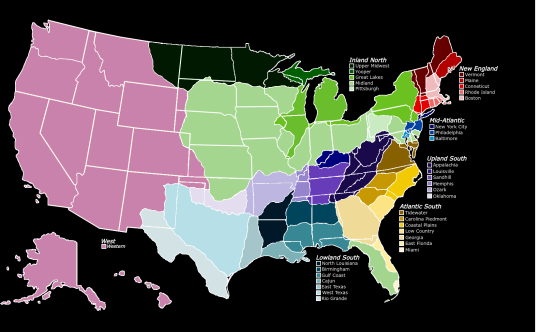
Map of American English accents
by u/oncxre
2K notes
·
View notes
Text
Map of British English dialects
by Ryan Starkey (Starkey Comics)
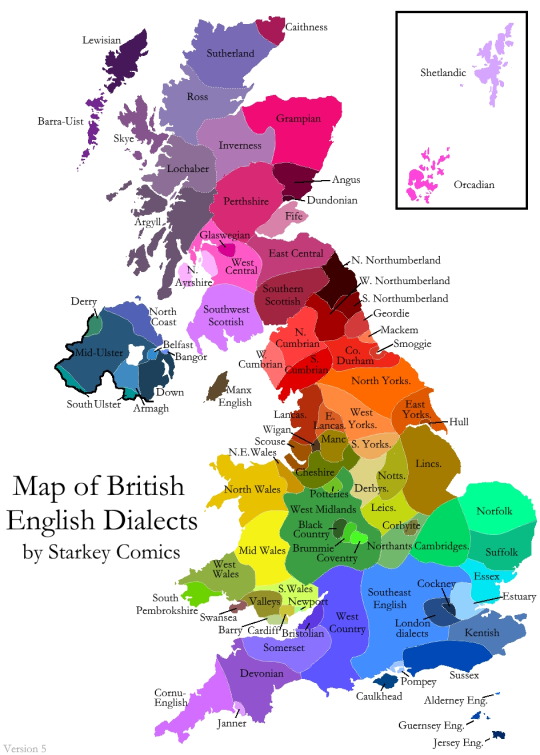
Author Ryan Starkey accompanies the map with a great article:
I’ve spent the last few years pooling together every study, survey, map, and database I can find, and then subjecting my image to several rounds of peer feedback. […] The end result is an image which is, to my knowledge, the most detailed map of British dialects ever made.
He also discusses “Why this map is wrong, and always will be”, and just how difficult it is to create a precise map of dialect regions.
Why is there so much dialect diversity in the U.K.? Because the longer a language is in a region, the more it tends to diversify. This is partly why, for example, there is a much larger variety of dialects spoken in the Eastern U.S. than the Western U.S.
Further Reading
The stories of English (David Crystal)
This is the perfect book to read if you want to know more about the history of dialect diversity in English, because the entire focus of the book is to show that English is not just one unified language (hence the plural “stories” in the title). It’s one of my favorite popular language books.
1K notes
·
View notes
Text

Hi there! I’m interested in how the meaning of "potato bug" varies by region, so I'm running a very short (~1 minute), anonymous survey to find out!
---SURVEY LINK---
You can complete the survey even if you've never heard of "potato bugs" before (but please indicate as much when prompted). Also, please be aware that the survey includes several photos of insects, so I'd advise against taking it if you're squeamish about bugs
Thanks and have a great day! :)
#Bugs#Insects#Potato bug#Potato bugs#Survey#Surveys#Entomology#Linguistics#Dialect Maps#Dialects#Polls#Research#Survey research#sC Original#Potato Bug Map#<- project tag#when I made my blog I never would've expected that bug-related dialect surveys would become a recurring theme but here we are
177 notes
·
View notes
Text
An isogloss, also called a heterogloss, is the geographic boundary of a certain linguistic feature, such as the pronunciation of a vowel, the meaning of a word, or the use of some morphological or syntactic feature. Isoglosses are a subject of study in dialectology, in which they demarcate the differences between regional dialects of a language; in areal linguistics, in which they represent the extent of borrowing of features between languages in contact with one another; and in the wave model of historical linguistics, in which they indicate the similarities and differences between members of a language family.
Wikipedia
57 notes
·
View notes
Text
Right, starting a war again

#this is only using the most common terms so unfortunately no scufflers or stotties here#ive seen so many maps which confine terms to specific counties which is crazy because all my friends are from the same city as me and we#still cant agree if its a cob a cake a bun or a roll#id say cob but thats just cause its what my parents say#on its own its a cob. a sandwich made with it is a butty#uk#british polls#uk polls#british memes#british dialects#dialects#british
13 notes
·
View notes
Text

British English Dialects
22 notes
·
View notes
Text
really all i should need to do to get professionally dx'd with autism is show them my warrior cats conlang from senior year of high school
#i'm technically not dx'd with autism. i have like one of those umbrella diagnoses#'Unspecified Neurodevelopmental Disorder'#aphelion.txt#wc#warrior cats#autism things#it was soo involved. had a lot of fun brainstorming grammar#selecting phonology reasonably similar to the sounds cats can make#made up a writing system of simple lines and dots and slashes that could conceivably be made by claws#even made up different accents for each clan#started brainstorming a Tribe of Rushing Water dialect/related language#and the mountain cat parent language that the clan and tribe languages would have descended from#THEN i started drafting a rogue/kittypet separate language#and the ways it interacted with the clan language causing loanwords and phonic drift#*phonetic drift sorry its been a while since my last linguistics hyperfixation#started making a dictionary using an app i downloaded on computer#THEN at that point i finally burnt myself out after like a month+ straight of hyperfixating#sometimes i still reteach myself the written language at random when i get really bored though#and use it to write secret messages in english#(because there is an alternate mapping for english phonetics. obvs)
11 notes
·
View notes
Text

Revisited my old khan redesign because this fella will forever be in a desperate need of an overhaul. Most of my old thoughts written out in that (almost two years old holy shit) post hold up so I'm not gonna go into much detail
The first one he usually wears around the sanctuary, simple but convenient cloths and such. The incognito look is the one that the outside world (aside from the other overseers) knows him as.
"Overseer khan is a bit of a mystery for most people, a kind but reserved fellow usually strolling around the jungle tourist shop and Ignitia, buying cigarettes or running odd errands with his Torrex. No one really knows where he lives and the overseer is more than happy to keep that a secret. Some say he works close with the infamous witch of the Citadel but alas... nothing verifiable"
Individual under the cut


#nexomon#nexomon art#nexomon khan#overseer khan#art#fanart#character art#character design#my art#redesign#my guy could have been so interesting but they fucked up so badly#anyway#in my ver i also hc as like#a keeper of knowledge and linguistic archivist#since a lot of people from different areas in the map have lived in the sanctuary#he writes down and archives dialects and cultures#Ventra's tree could be a gicantic library on the inside with millenia old books and knowledge#everytime i remberer this section i both cringe and weep
15 notes
·
View notes
Text
writing fanfic is near impossible. do you guys really say things like “cheeky sod”
#that doesn’t sound right but I don’t know enough about british conversational dialogue to dispute it#I love the word cheeky but it simply is not used in usamerica#I have so much fun listening to my shows and then I try to write something that sounds natural#and it’s like.. is this offensive??#genuinely never get tired of the infinite variety of accents y’all got going on over there#I need to make some sort of map#pop all the taskmaster contestants on it so I can start to see dialect patterns#instead of nodding along sagely#(clueless)#britcom#taskmaster#doctor who
16 notes
·
View notes
Text
Major in Linguistics, they said! It’ll be fun, they said………
#zeeposting#help me God#you put so many different languages and accents in an isolated location#and dialects are born#even wondering about the fuckin#accent map of the neath has me off my shit#especially considering just how isolated some of these groups are#venderblight has a fucking nyc type complexity of accents#by city era. by district .#good lord
12 notes
·
View notes
Photo

America’s Digital Dialects: How Reddit reveals the geography of American English
253 notes
·
View notes
Text
Making my own region for a dnd out of spite for lack of mesoamerican (in the case of this region, Nahua) cultures and cities as well as also inserting the names of cities from my country because of their meanings (like for example Nahuizalco means "Four places of obsidian" god thats so cool)
#zagreus rambling#I also have a google doc writing everything with charts and drew the overall map of the main region + two isles close to the mainland#if I ever expand it I would add a Mayan based religion and investigate more of the Lencas to also give them some spotlight#since they were also one of the big cultures here in centroamerica#if I ever finish this cohesebly Ill think about sharing it with yall in case yall are interested#I have also written about the races that are native to the mainland#buuuuuut mostly its me taking these races from dnd and making them less... ya know#like Im skipping a lot of “lore” of the races in the forgotten realms and making them all live in (mostly) harmony with one and another#also less racism between them 😬 most you will find is racism towards faerunians and their turism done in the region#and unlike the maztica region there will be no fcking colonizing of them.#why are people so obssessed with always adding the colonization of mesoamerica even in fantasy?!#also my year long investigation of deities. traditions and culture is helping me a lot on this#I was supposed to use it for the webcomic and im using that knowledge for dnd awebo#I also want to play with the northern region having the nahuatl dialect meanwhile in the south/west and in the isles the dialect is nawat
8 notes
·
View notes
Text
What does "potato bug" mean? (Survey results)
The results are in for my survey looking at possible regional differences in how the term “potato bug” is used, and, as I hoped, there were some interesting regional patterns!
In total there were 420 responses, and major results are summarized below the cut (note: there are also a bunch of photos of bugs, just be aware). I’ll also add more specific/minor results in a reblog (linked here) ~
A “potato bug” according to Americans* and Canadians (*except Californians):
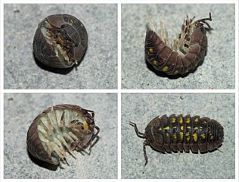
A majority of Canadian respondents (14/19, or ~74%) as well as a plurality of American respondents (128/362, or ~35%) indicated that “potato bugs” are the tiny isopods that curl into a ball (also known as “roly polies,” “pill bugs,” and many, many other regional names)
Notably, the usage of “potato bug” to refer to the roly poly appears to be geographically widespread within the United States, with the roly poly being selected by at least 20% of respondents from all US subregions except for the South Central parts of the country (around Texas).
Curiously, Wikipedia lists the UK as being a region where “potato bug” can refer to these kinds of woodlice, but not a single UK respondent selected the roly poly, and only a small minority—2/15—indicated that they had ever even heard the term at all.
A “potato bug” according to Californians:
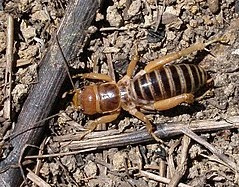
Californians were unusual among Americans in that a majority of Californian respondents, 29/46 (63%), indicated that the term “potato bug” refers to the cricket-like members of the tribe Stenopelmatini, more commonly known as the “Jerusalem cricket” (although, as I have explored here before, these critters also have many delightful alternative names). This usage is notably uncommon elsewhere in the country, with only 25/316—8%—of non-Californian US respondents selecting the Jerusalem cricket as the “potato bug.”
A “potato bug” according to Europeans** (**kinda…sorta…):
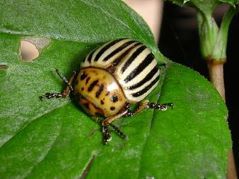
A majority of non-North American respondents indicated that they had never heard of a “potato bug” before, 23/39 (59%). However, among the subset of Europeans who had heard of potato bugs, an overwhelming majority selected the Colorado potato beetle as the “potato bug,” 12/14 (86%). Notably, although these bugs are endemic to the central US, they have spread to Europe as an agricultural pest, which may partially explain this pattern (although as a caveat, the sample size for non-North American respondents was quite small and so this result should be taken with a big grain of salt!).
American respondents occasionally selected this bug, too, although it was not an especially common choice, with 49/362 (14%) of Americans selecting the Colorado potato beetle and no US subregions showing even a 1/3 selection rate for it.
Other potato bugs?
25 respondents indicated that the term potato bug referred to a type of bug that wasn’t included in the survey, with the comments suggesting other potential “potato bugs” might include potato weevils, June bugs, spined soldier bugs, boxelder bugs, and ladybugs. There were also a couple of general descriptions of bugs that I couldn’t quite match to anything specific.
Most of these other potential “potato bug”-types were only mentioned once, although the most common among them—the June bug—was described by 5 different respondents.
Overall Numbers
Overall, 289/420 (~69%) of respondents had heard of “potato bugs” before, with the term appearing to be predominantly a North American expression: 273/381 (72%) of North American respondents were familiar with the term, compared to 16/40 (40%) of non-North American respondents.
Here’s the response totals for how often each “potato bug” type was selected:

~
Alright, that’s all for now—maps/data tables coming in a reblog available here. :)
#Bugs#Insects#Potato bug map#Potato bugs#Potato bug#Survey results#Surveys#Graphs#Graph#Dialect Maps#Linguistics#Slang#Roly poly#woodlouse#Pill bug#Jerusalem cricket#Child of the Earth#jailbug#Colorado potato beetle#Potato beetle#sC original#someday I will learn how to be succinct when writing these. someday.
21 notes
·
View notes
Text

LANGUAGES IN NORTH AMERICA
Silvio Pasqualini Bolzano inglese ripetizioni English
#dialects#lexicography#lexicology#linguistics#american english#english#languages#mexico#united states#canada#history#maps#geography
3 notes
·
View notes